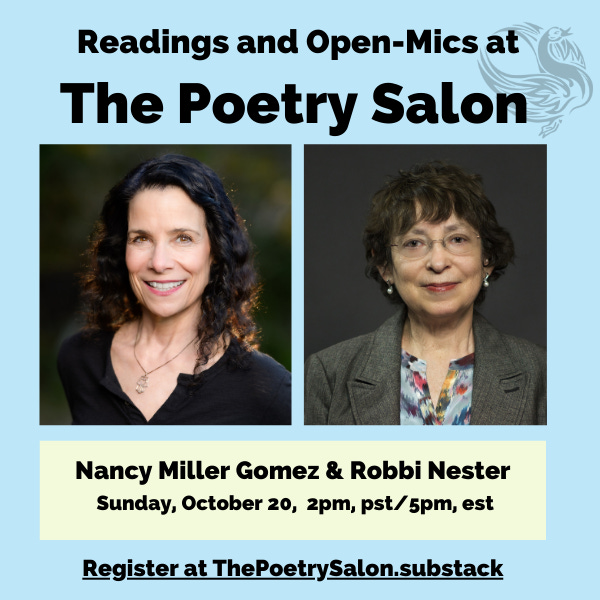The Stories We Want to Tell: Nancy Miller Gomez on Writing her Book, Inconsolable Objects
Out from Yes, Yes Books
Hi poets, writers and friends, when you subscribe to this Substack, you get access to a free reading and open-mic with two guest poets each month. Register for the Oct 20th Reading and Open-Mic Here.
Become a paid subscriber, and you will also get access to 3 workshops with me (Tresha) and special guest facilitators! (Link is visible to paid subscribers at the bottom of this email.)
The Stories We Want to Tell: Nancy Miller Gomez on Her Book, Inconsolable Objects (Yes, Yes Books)
Register for the Oct 20th Reading and Open-Mic Here
Poems
How Are We Doing? The man working window eleven at the DMV wears a happy face pinned to his nametag as if he’s hosting a social event. But even from here, three people back, I can see Frank is having a bad day. He keeps tapping the same key, hoping the computer will do something different. Poor Frank tapping harder and harder, pausing sometimes to stare owl-eyed at a young woman waving her paperwork as if she’s trying to reignite a dying fire. Her pretty face has grown ugly in anger. She smacks the counter, demanding to know the problem. Roused from her desk, a grenade-shaped woman drifts over to hover above Frank. She gives him directions in a tight, managerial voice (so unmusical, you’d call it noise) while Frank continues to tap and tap until she commandeers his keyboard, fixes the issue and walks off, leaving the stamping and stapling to Frank, who hustles with a deference that hurts to watch. Meanwhile the man in front of me has given up and huffed out of the building. But Frank, I want to lean over the counter into your small, personal space and straighten your reading glasses that have gone askew. Their broken frames hang cockeyed off the thin bridge of your nose like pipe cleaners in a preschool project. I want to batten down that piece of your hair sticking up. Except I’m still in a line that isn’t moving, and I fear the office will close before I’ve had a chance to tell you how sorry I am that life has brought you here to this place where all these people unwind like a frayed rope into the unhappy well of your workdays. But finally, it’s my turn, Frank, to look you in the eyes and ask you to process my papers. How hard is it, really, to notice the way you bunch one corner of your mouth into a half-smile or blink at the mention of your name, a name I have carried in my heart for all of these twenty minutes. So when you hand me back my temporary license, along with a form that asks, How are we doing? I want to believe there is someone watching over us to whom I can respond, Please, we’re not doing well here. The doors to the building have been locked. The office is empty. We are lonely and hurting, and night has just begun. Tilt-A-Whirl It was a hot day in Paola, Kansas. The rides were banging around empty as we moved through the carnival music and catcalls. At the Tilt-A-Whirl we were the only ones. My big sister chose our carriage carefully, walking a full circle until she stopped. The ride operator didn’t take his eyes off her long dark hair and amber eyes, ringed like the golden interior of a newly felled pine. She didn’t seem to notice him lingering as he checked the lap bar and my sister asked in her sweetest, most innocent — or maybe not-so-innocent — voice, Can we have a long ride please, mister? When he sat back down at the joystick, he made a show of lighting his smoke while the cage of his face settled into a smile I would one day learn to recognize, and then those dizzying red teacups began to spin my sister and me into woozy amusement. We forgot the man, the heat, our thighs sticking to the vinyl seats, our bodies glued together in a centrifugal blur of happiness beneath a red metal canopy as we picked up speed and started to laugh, our heads thrown back, mouths open, the fabric of my sister’s shirt clinging to the swinging globes of her breasts as we went faster, and faster, though we had begun to scream Stop! Please stop! Until our voices grew hoarse beneath the clattering pivots and dips, the air filling with diesel and cigarettes, and the man at the control stick, waiting for us to spin toward him again, and each time he cocked his hand as if sighting prey down the barrel of a gun.
Text within this block will maintain its original spacing when published
Failed to render LaTeX expression — no expression found
Summary
How long does it take to follow your true calling? In this interview Nancy Miller Gomez discusses her life and work, pre-and post poetry. From lawyer to T.V. producer to poet she always wanted to tell stories that were important and now, with her first book, Inconsolable Objects she is doing just that. Drawing from daily observation to long-held, emotionally charged memories, to stories on the news, Nancy pulls inspiration from multiple sources to create poems that speak of both sorrow and kindness, separation and connection. Afterall, she says “what else do we have, but each other?”
References
Tara Miller Interviews Her Mother, Nancy Miller Gomez for Gulf Coast
Lucille Clifton, “Jasper Texas, 1998”
Prompt
Collect some strange stories. When you read the newspaper, etc. etc. look for interesting ideas for poems. Keep a file of them. One place that I turn to for that is Bananas.
Check Out The Poetry Salon’s October Events
Paid subscribers will see the link to all paid events below.
Keep reading with a 7-day free trial
Subscribe to The Poetry Salon with Tresha Faye Haefner and Friends to keep reading this post and get 7 days of free access to the full post archives.









